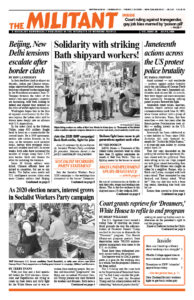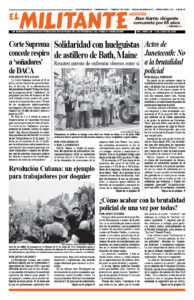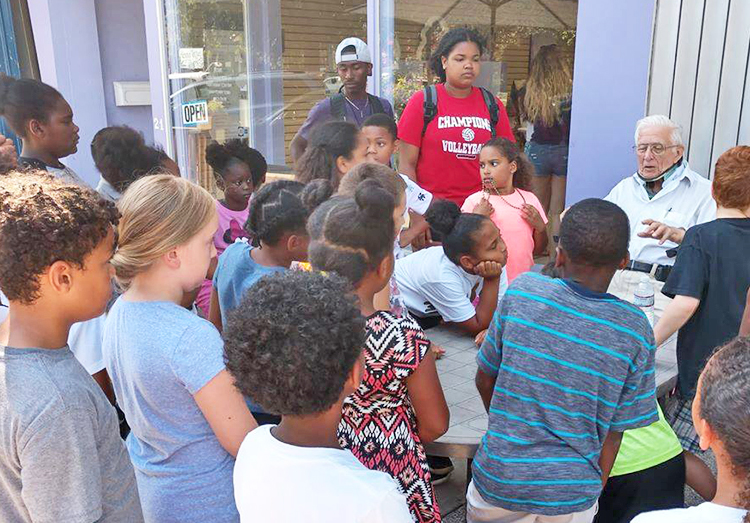Perpetuating their smear campaign against the Gibson family who own a small bakery, Oberlin College asked the Ohio Court of Appeals June 5 to overturn a 2019 jury verdict finding the college and Dean of Students Meredith Raimondo guilty of libel for slandering the Gibsons as racists.
The college falsely portrays the guilty verdict and $32 million award for damages and fees as an attack on the constitutional right to free speech and on students’ right to protest. It is getting support from some organizations who have filed “friend of the court” briefs to support their argument. This includes the NAACP, a historic civil rights group, and the Reporters Committee for Freedom of the Press and Freedom to Read Foundation, organizations that have defended constitutional rights in the past.
But working people, opponents of racism and all defenders of constitutional rights who look at the facts will find a big capitalist institution, Oberlin College, waging a protracted and costly legal battle to drive the Gibson family and its bakery out of business. Or as the Gibsons put it in their brief, “to Bully Anyone in the Oberlin Community.” The college has assets of more than $1.4 billion and is the largest property owner in the city of Oberlin.
The college’s attorneys in their filing note that the incident that sparked the conflict began when an African American student was caught “concealing two bottles of wine and trying to buy a third with a false ID” at Gibson’s convenience store and bakery in downtown Oberlin on Nov. 9, 2016.
Allyn Gibson Jr., a store employee and son of co-owner David Gibson, tried to detain the student. According to the police, the student and two women friends had Gibson Jr. on the ground and were pummeling him. The cops arrested the three students.
Oberlin College attorneys claim university officials had nothing to do with organizing or directing two days of student protests outside the bakery that followed the arrests.
Dean ‘organized’ to promote slander
But that’s not what the facts show or the Lorain County jury found.
Witnesses testified that they saw Dean Raimondo passing out flyers at the protest calling for a boycott of the store and accusing it of being “a RACIST establishment with a LONG ACCOUNT of RACIAL PROFILING and DISCRIMINATION.” She addressed the crowd with a bullhorn. The college allowed its copy machines to be used to reproduce the flyers. Yet the administration continues to insist that Raimondo was only there “to make sure the protest remained safe and lawful.”
An email invitation from Raimondo sent out Nov. 10, 2016, shows otherwise. “A staff group will meet at 9:30 in Wilder 105 to talk about how to support students who are protesting,” she wrote.
On Nov. 14 Raimondo ordered the company that runs the campus dining commons to cancel its contract with Gibson’s — ending a 100-year-old business partnership with the college — dealing a big financial blow to the small business.
Responding to a letter titled “Gibson’s Boycott Denies Due Process” by Roger Copeland, an emeritus professor of theater and dance at the college, published later in the Oberlin Review, Raimondo sent out an email saying, “F—k him. I’d say unleash the students if I wasn’t convinced this needs to be put behind us.”
Does that sound like “neutrality?”
In one egregious section of the college’s appeal, the college’s attorneys float an accusation that Allyn Gibson Jr. — who was not a party to the lawsuit — is biased against Blacks. They print a heavily redacted excerpt from a sealed deposition by Gibson Jr. But the deposition was never used in the lawsuit trial, nor was he called to testify. They intimate that the Gibsons have something to hide. More mud slung at the family.
Gibsons refused to bow down
Soon after the protests, college administrators tried to get the Gibsons to request that charges against the students be dropped and in the future to call college officials, instead of the cops, whenever students are caught shoplifting. The Gibsons refused, saying they would treat students exactly as they treated anyone else in town, no special treatment. Their stand resonates with working people in the area who have faced decades of declining wages and working conditions.
The three students involved in the shoplifting pled guilty on lesser misdemeanor charges and stated expressly that there was no racial profiling involved in their arrest and prosecution.
From the courtroom where the students were pleading guilty, Assistant Dean Toni Myers texted Raimondo, “I hope we rain fire and brimstone on that store.” This was nine months after their arrest!
Gibsons’ attorneys are arguing that the judge’s decision to reduce the original award by $13 million because of a state law capping damages infringed on the constitutional right to a jury trial and to due process. They are demanding the full damages be reinstated.
By twisting the facts, the college tries to portray itself as the victim and the victim as the criminal. But the Gibsons refused to submit. They have widespread support from working people across the area for standing up to the college during the trial and afterward.
Amicus briefs miss the point
Among the briefs filed to buttress the college’s campaign is one from the Reporters Committee for Freedom of the Press, Freedom to Read Foundation, American Booksellers Association, the Washington Post and other media groups. It claims the jury’s unanimous verdict against the college is a threat to news media, booksellers, and libraries because they cannot “vet every piece of externally-generated information they redistribute.”
But Oberlin College was not sued by Gibson’s for “redistributing” material. Raimondo and other school administrators were centrally involved in promoting the slander against the Gibsons and years later are still using the university’s substantial clout to try to drive the bakery owners out of business.
The brief by the NAACP ignores the facts in the case and takes for good coin Oberlin College’s slander about the “bakery’s historically discriminatory treatment of African-Americans” and then raises concern that the verdict undermines the right to boycott, “a core First Amendment-protected activity” — like those carried out against racist practices during the civil rights movement.
The boycott promoted by Oberlin College, based entirely on a smear and directed at a family-owned business, is the polar opposite of boycotts that were part of the mighty battles that uprooted Jim Crow segregation. The college’s boycott campaign undercuts the fight against racism because there was never any truth to the accusations against the Gibsons.
The college also received support from nearly 30 “First Amendment Scholars” to file an amicus curiae. They claim that charges of racism “cannot be proved true or false” and that even if they could, in this case the jury found “no actual malice.”
One wonders if these “scholars” read the verdict, where the jurors found “clear and convincing evidence” that Oberlin College acted with “hatred, ill will, or a spirit of revenge” or with “a conscious disregard for the rights” of the Gibsons.
First Amendment rights to free speech and assembly provide working people with vital protections against government interference in our lives, but do not protect those who slander or libel others.
Claiming that the amendment protects the right of a capitalist institution like Oberlin College to slander a family with a small business trying to ruin them with impunity, turns the Bill of Rights on its head.


